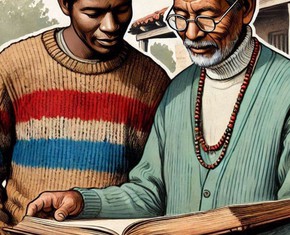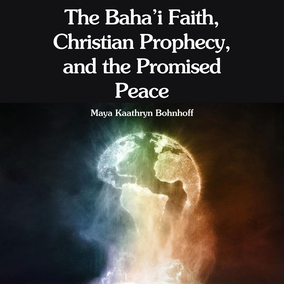The views expressed in our content reflect individual perspectives and do not represent the authoritative views of the Baha'i Faith.
Baha’u’llah’s vision for a spiritually and materially prosperous world civilization goes beyond merely putting out a set of lofty objectives.
It also contains guidance for the peoples of the world on what kinds of methods will lead to its accomplishment. One of its most important principles? To work with people rather than against them in the path of social and spiritual transformation. This strategy dates back to some of the earliest years of Baha’u’llah’s public life.
In the history of the Baha’i Faith, the late 1840s and the early 1850s represent two opposing extremes. On the one hand, there were the extreme joys of a new prophet, Siyyid Ali-Muhammad, the Bab, appearing on the horizon of human history and the passion he kindled in the masses of his followers for a new era of justice and prosperity. On the other hand, there were the extreme sorrows of his execution and the genocidal campaign the civil and religious leaders of Iran launched against more than 20,000 of his followers. In its tumultuous wake, the following decade brought a time of great confusion and insecurity for the remaining Babis. Not long after his execution, three of the Bab’s emotionally distraught followers even tried to kill Iran’s powerful monarch, Nasiri’d-din Shah.
Other survivors placed their hopes in Baha’u’llah, who had lived in government-imposed exile in Baghdad, Iraq since 1852—and who had not yet accepted the role of the Divine Messiah prophesied by the Bab. During that period, Baha’u’llah’s writings and conversations laid the foundations for the vision of world civilization he would develop over the following decades. Baha’u’llah was absolutely opposed to the assassination attempt. People came to him in Baghdad looking for his guidance, and perhaps more importantly, for hope. Among them was a man named Haji Hasan-i-Turk. Little is known of him. But a single anecdote from his life illustrates the approach to social and spiritual progress that Baha’u’llah worked to impress upon everyone around him:
A new life was, indeed, breathed into [Haji Hasan-i-Turk]. Although devoid of learning, he began to compose a commentary on the Bab’s Qayyumu’l-Asma. But most of the time he said not a word. When his silence was commented on in the presence of Baha’u’llah, He observed that the Haji’s turn to speak would come soon. Then one day Haji Hasan came to Baha’u’llah, arrayed with a dagger, and asked for his permission to go, with dagger drawn, to stand on the bridge and proclaim to all the Cause of God. Baha’u’llah told him kindly, but firmly: ‘Haji, put aside your dagger. The Faith of God has to be given with amity and love to receptive souls. It does not need daggers and swords.” – from Hasan Balyuzi’s Baha’u’llah: The King of Glory, p. 134.
I think we would look too narrowly at Baha’u’llah’s statement if we only saw in it a rule for how people should change or accept a religious identity. The sword is not just a symbol of forced conversion. It can also represent any approach to governance and bringing about broader social change based on coercion.
For the rest of his life, Baha’u’llah emphasized elevating and positively influencing the motivations and practical capacities of a population. His strategy? To improve society directly at the level of its culture and organic functioning, rather than attempt the roundabout shortcut of coercive domination and threat of violence. In his exchange with Haji Hassan, Baha’u’llah illumines the centerpiece and starting-point of this strategy: “amity and love to receptive souls.”
Let’s focus on this important point for a moment. People always display their greatest dedication and commitment through love. When any of us do something out of love, it concentrates our thoughts and refines our inner strength. When our love is deep enough, no challenge can drown us in despair. In 1913, Baha’u’llah’s son Abdu’l-Baha said:
In the world of existence there is indeed no greater power than the power of love. When the heart of man is aglow with the flame of love, he is ready to sacrifice all—even his life. – Paris Talks, p. 174.
Baha’u’llah sought to nurture in his followers love for all people, for God’s beauty, and also for justice, piety, wisdom and other spiritual attributes. To cherish Baha’u’llah’s vision of a spiritually and materially prosperous world civilization is to kindle within oneself the desire to work for its realization. And if that love spreads to receptive souls, the power of their inner motivation will reinforce its forward progress.
This I think is one of the most useful starting points for understanding why Baha’is do things the way they do. It helps explain Baha’is’ intense interest in education, their avoidance of political partisanship, their dedication to teaching people the basics of Baha’i belief, and their determination to collaborate with others in pursuit of positive change even if those people don’t become avowed practitioners of the Baha’i Faith. Baha’u’llah’s vision of a better world inspires people to develop their capacity to serve one another and contribute to constructive social change–and all of that begins with acts of amity and love to receptive souls.
















Comments
Sign in or create an account
Continue with Googleor